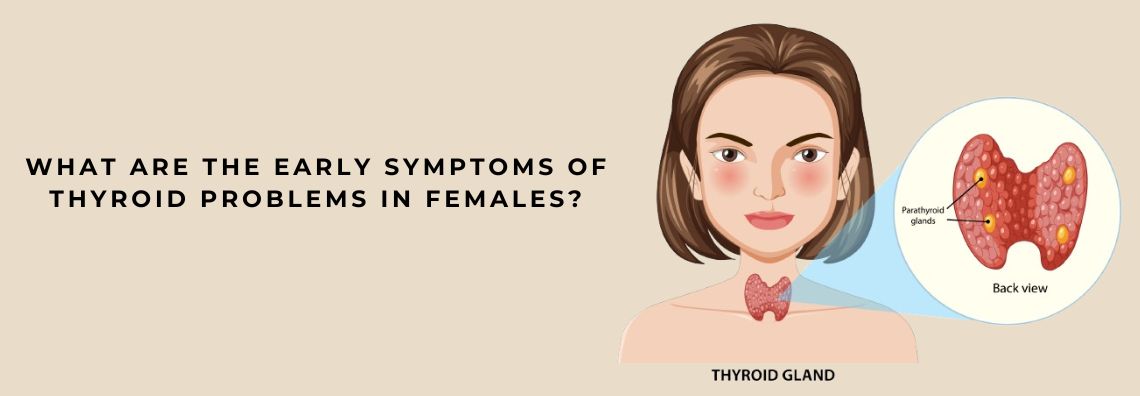
Women are more likely to experience thyroid issues than men. While thyroid issues can affect approximately 6% of men, the prevalence among women is around 11.4%.
The small, butterfly-shaped gland in the neck just under the Adam’s apple is the thyroid. Although small, it is crucial in regulating numerous bodily functions, including metabolism, temperature control and hormone production. When your thyroid becomes overactive or underactive, it can lead to several symptoms and health complications.
In this guide, we will help you understand the symptoms of thyroid problems in females, and this will help you decide when you must visit a thyroid specialist.
Symptoms of Thyroid Issues in Females: A Thyroid Specialist Can Help
It is important to note that some symptoms might appear as fatigue, low energy, and hair thinning. These are some of the common issues in our daily life, but when these become severe, it is important to consult a thyroid specialist or a healthcare professional. Moving ahead, here are some of the symptoms you need to pay attention to, especially thyroid issues in women:
Fatigue and Low Energy
Feeling low and not well after a disturbed sleep schedule is normal, but feeling the same even after having a good night’s sleep is something to pay attention to. Low energy and fatigue are common issues when hypothyroidism develops in women.
Thyroid hormones are responsible for regulating energy levels in the body, and low levels can result in these symptoms. Your daily schedule might get affected because of this low energy.
Weight Fluctuations
Are you gaining weight even after proper diet and exercise, or are you losing weight without effort? Maybe your body is telling you there is a problem with the thyroid gland because hypothyroidism (underactive thyroid) often leads to weight gain, and hyperthyroidism (overactive thyroid) can cause weight loss. Immediately consult a specialist for a thyroid test.
Mood Swings
Thyroid hormones are responsible for influencing brain chemistry, and their imbalance can impact mood and emotional well-being. Not every mood swing is because of your period, but the thyroid issue can be behind it. How?
Hypothyroidism is associated with symptoms like depression, mood swings, and difficulty concentrating. Whereas, hyperthyroidism can cause anxiety, restlessness, and irritability.
Skin Changes
Dry, tichy skin and changes in skin texture observed frequently might indicate thyroid issues. It is important to note that hypothyroidism can lead to dry, rough skin, while hyperthyroidism can cause excessive sweating and moist, warm skin.
Disturbed Menstrual Cycle
Are you getting irregular periods? Disturbance in the menstrual cycle is another common symptom of thyroid issues in women. Women with heavy, prolonged, or irregular periods may have symptoms of hypothyroidism, and those with hyperthyroidism may have lighter or infrequent periods.
Digestive Problems
Digestive issues are the other common symptom of thyroid issues in females because hypothyroidism and hyperthyroidism can affect digestion. Where hypothyroidism can cause constipation, bloating, and a sluggish digestive system, hyperthyroidism may result in increased bowel movements and diarrhoea.
Heart Rate and Blood Pressure Changes
An overactive thyroid can accelerate the heart rate, causing palpitations, rapid heartbeat, and high blood pressure. An underactive thyroid can lead to a slower heart rate and low blood pressure. It is important to consult a healthcare professional and report to them regularly about the heart rate changes and blood pressure.
Temperature Sensitivity
Thyroid imbalances can become responsible for disturbed body temperature. Hypothyroidism symptoms in women often include feeling cold and having a lower body temperature, while hyperthyroidism symptoms may include feeling hot and having an increased sensitivity to heat.
Are you having thinning hair, hair loss and dry brittle hair? It may indicate some issues with thyroid hormone levels, so consult a healthcare expert who can guide you on the right path.
When To Seek Medical Advice?
Symptoms such as fatigue, low energy, hair loss and mood swings may seem common symptoms as one can experience them in daily life, but it is essential to report if they appear more often or fatigue doesn’t go away even after hours of sleeping and rest. There are some points to consider:
- If you have any of the above-mentioned symptoms, especially if they are persistent or worsening, or if you’ve been diagnosed with hypothyroidism but your symptoms don’t improve with treatment, it becomes crucial to report.
- If your thyroid-stimulating hormone (TSH) level is above 10 mIU/L or between 4.5 and 10 mU/L, you must visit a thyroid specialist.
- A lump or swelling in the neck can be an indication of a thyroid issue, and it is essential to see a specialist on time.
So, in case of thyroid issues, especially in females, consulting a thyroid specialist is a wise decision to make on time.